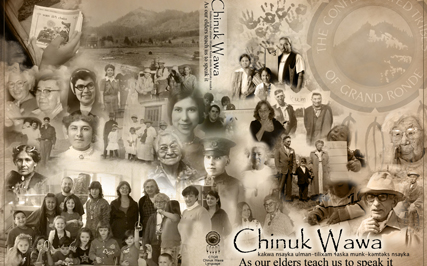Tribal Government & News
Updated Chinuk Wawa dictionary almost ready for publication

Tribal Council is capping off more than 10 years of work at the Cultural Resources Department with an allocation of $16,500 for 300 hard-cover and 5,000 soft-cover copies of the department's Chinuk Wawa dictionary.
The publication, running almost 500 pages, includes about 1,000 core words and about 3,000 compound words documenting the language as it was spoken by past generations of Grand Ronde Indians.
The new edition is about one-third larger than the working dictionary the department had created by 2001, said Henry Zenk, an anthropologist with a University of Oregon Ph.D. awarded in 1984.
Zenk's thesis documented the Chinuk Wawa language thanks to his contact with the five Hudson sisters -- Gertrude Mercier, Velma Mercier, Martha Mercier, Eula Petite and Ila Dowd -- as well as other Tribal Elders including Clara Riggs, Wilson Bobb, Esther LaBonte, John Petite, Ethel Petite Logan, Nick Leno, Elmer Tom, Dellmore Croy and Pauline Johnson, all fluent in Chinuk Wawa.
Former Cultural Education Coordinator Tony Johnson (Chinook) initially brought Zenk in as a linguistic consultant. "Part of my job description," he said, "was to develop the dictionary." He has been working on it for the department since 1998."
Zenk first came to Grand Ronde in 1978. "I was looking for a photo of (former Tribal Elder John B.) 'Mose' Hudson for an article," he said.
The dictionary includes sections on the language's local speakers, the alphabet, a pronunciation guide and the grammar of Chinuk Wawa. In addition, following the words, definitions and etymologies (origins) of words, the dictionary includes a picture gallery and biographical sketches of the Tribe's fluent Chinuk Wawa speakers, texts from the Hudson and Wacheno families, from Clara Riggs and a letter from Esther LaBonte.
Field transcripts are included from recordings made by University of Washington anthropologist Melville Jacobs of John B. Hudson and Victoria Howard, both former Tribal Elders.
Two Catholic missionary texts also are included since Catholic priests at Grand Ronde and elsewhere used primarily Chinuk Wawa to reach local Indians.
The book is dedicated to former Tribal Elder Jackie Mercier Whisler, a Chinuk Wawa teacher at the Tribe who contributed much to the dictionary before her passing in 2007.
There also are examples of lower Columbia Chinuk Wawa that come from beyond the Grand Ronde community included in the book. Sources for these examples include Catholic missionaries in the lower Columbia region, as well as materials from the Willapa Bay community in what is now southwestern Washington.
Though the language was originally used across a wide geographic area, "This is Chinuk Wawa as our Elders, meaning Grand Ronde Elders, teach us to speak it," said Zenk.
The dictionary is now in the final editing phase. Zenk's copy is festooned with hundreds of post-it notes bearing edits for nearly every page. Completion and publication are expected in the summer.
While the Tribe is funding the publication, the department is simultaneously working with a university press for distribution services, Zenk said.
"It is a hybrid language from different mother tongues," said Zenk. "It is uncertain how old the language actually is. There is a controversy among scholars. Some say that it arose as a response to the first foreign traders arriving in the late 18th century (starting in 1792). The first traders came by ship to the mouth of the Columbia River and traded for Indian furs.
"Other scholars believe that the hybrid language is actually older and was used among different Tribes earlier in the aboriginal, or Native, trade."
Whatever the origins, it was already in widespread use in 1856 following the Trail of Tears when the Grand Ronde Tribe was formed.
"The most important part of the vocabulary is from the Native Chinookan languages of the lower Columbia River," Zenk said, "and they are who-knows-how-many-thousands-of-years old.
"It might be pointed out that the Chinookan pronunciations and word forms are faithfully preserved in Chinuk Wawa as it was spoken by Native people. White speakers tended to distort these original Native pronunciations. In our language program, we strive to remain true to original Native pronunciations."
At Grand Ronde, Chinuk Wawa was rapidly adopted by treaty-signing Tribes that spoke eight different Native languages.
"Fur traders, settlers, pioneers and French Canadian voyageurs (French and French-Indian fur company employees from Canada) all learned the language quickly, helping to make it a common language throughout the Northwest," said Tribal member David Lewis, who is also manager of the Cultural Resources Department.
Some early Tribal families, like the Petites, the Norwests, the LaBontes, the LaChances, the Vivettes and the Pichettes were descended from French-speaking voyageurs who married local Indians.
The French Canadian speakers added their color to the language that grew with added usage then and continues to grow today as more people speak it.
"I think of this as an expression of the heritage of the Grand Ronde community," said Zenk.
"It's going to be a great resource for Tribal members wishing to understand and use the language," said Lewis.
About half of the words come from Chinookan languages spoken along the lower Columbia River, Zenk said. Of the other half, some 10 percent each come from English and French Canadian speakers, 5 percent are Nootka words from Vancouver Island in British Columbia and 5 percent are Salishan words. Some words come from still unidentified languages or language mixes.
Credit goes to Cultural Resources staffers past and present for contributions to the project, and to Elders who spoke the language and some who continue to speak the language. Formatting and design credits go to Sarah Braun Hamilton, a linguistics student at Portland State University, who got involved with Chinuk Wawa classes a few years ago.
Thirty to 35 adult learners have attended Tribal Chinuk Wawa classes and attained a "high-intermediate" skill in the language, said Zenk.
"I'm very grateful to the Tribe for having supported this," Zenk said. "I'll sure feel good about this when it's done."
